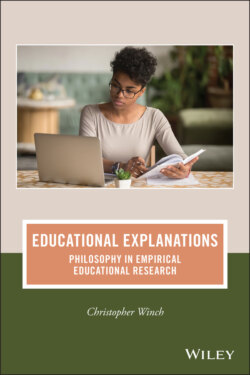Читать книгу Educational Explanations - Christopher Winch - Страница 22
CAN A CRITERIAL CONCEPTION OF TRUTH BE DEFENDED?
ОглавлениеIn this last part of the chapter I wish to consider some possible problems for the view that has been developed so far.
The first is that criteria change over time (they are revisable) and so what was taken to be true at one time may not be at a later one. We need to remind ourselves that to say that p is true is not to say that it corresponds with reality, but that the ways in which its truth should be determined have been satisfied. This will, in many cases, involve ‘looking at reality’,24 but it does not follow that it means investigating whether or not it corresponds with reality, for reasons we have already noted. Our responsibility is to ensure that our criteria are as robust as they can possibly be, not to always adopt a provisional attitude to our findings, which suggests that they are always open to doubt. Such an attitude leads to a radical scepticism about educational research which, it will be argued in Chapter 3, is untenable. However, in doing this, we need to have a clear view of the scope of the criteria that we use. We cannot assume that robust criteria are universally robust, that they apply synchronically across all contexts. We cannot assume that the criteria we employ in developed English-speaking countries to determine whether someone is functionally literate will be adequate or suitable in other contexts with different levels of economic development, different writing systems and different expectations.
The second point of difficulty relates to the inevitable differences of perspective on practices that conscientious educational research will very often reveal. These will very often be different or even alien to those held by the researcher, making them difficult to understand as educational practices, the beliefs associated with them appearing well-nigh unintelligible. How can criteria developed for certain purposes be applicable in such different circumstances? We argued in Chapter 1 that there are certain constants in human life and that preparation for adult life (either before or during adulthood) is one of those constants. This truth25 in turn yields us categorial concepts which allow us to form a bridgehead (in Hollis’ terms) into understanding such practices. Such activities have a purpose, there is learning and content to that learning, there are ways of preparation, there are resources used and criteria for success. These give us an outline framework for making sense of what we are investigating. Beyond that we are often in the realm of contestation and must rely far more on hermeneutic techniques if we are to make any progress in understanding the practices, let alone being able to provide descriptions and explanations of what is going on in them. A number of abilities may be required at this point: the ability to examine a practice in depth, the imaginative ability to relate what we observe to what we know about our own practices (see the Evans-Pritchard examples above), the ability to develop concepts and extend those that we already have to accommodate features of these practices for which we do not have ready to hand an adequate conceptual apparatus (see the comments on German vocational education above). Taking account of different perspectives is undoubtedly demanding – it is not impossible but illustrates the challenges involved in carrying our educational research.
Third, investigation may reveal not only that perspectives may differ, but that they are inconsistent with each other, or even contradict each other. From the perspective of the Indian state, for example, education may first and foremost consist in basic primary education according to the prescriptions of the Right to Education Act of 2009. From the point of view of a tribal community, such a prescription may present a mortal danger to the educational practices of the community and thus be anti-educational in nature. We have here two radically different perspectives on education, with accompanying different criteria for what is to count as an educational practice.26 But we are not here dealing with two different realities, but with different perceptions of what is to count as a worthwhile educational practice. We can understand both perspectives but only if we are able to take the kind of imaginative and hermeneutic steps necessary to comprehend each. Persuading one party of the other’s point of view is another matter and may involve a range of possibilities.
